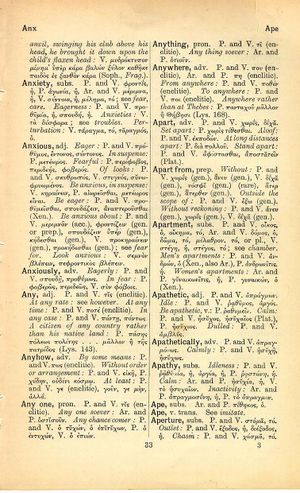ape: Difference between revisions
From LSJ
Sophocles, Antigone, 523
(Gf-D_1) |
(3_1) |
||
| Line 14: | Line 14: | ||
{{Gaffiot | {{Gaffiot | ||
|gf=<b>ape</b> [arch.], arrête, empêche : P. Fest. 22, 17 || <b>apet</b>, <b>apēre</b> Gloss.||<b>apet</b>, <b>apēre</b> Gloss. | |gf=<b>ape</b> [arch.], arrête, empêche : P. Fest. 22, 17 || <b>apet</b>, <b>apēre</b> Gloss.||<b>apet</b>, <b>apēre</b> Gloss. | ||
}} | |||
{{Georges | |||
|georg=ape (v. archaist. [[apio]]) = prohibe, compesce, Paul. ex [[Fest]]. 22, 17. Vgl Gloss. ›[[ape]], κώλυσον‹, u. ›apet, ἀποσοβει‹. | |||
}} | }} | ||
Revision as of 09:16, 15 August 2017
English > Greek (Woodhouse)
subs.
Ar. and P. πίθηκος, ὁ.
v. trans.
See imitate.
Latin > English (Lewis & Short)
ape: prohibe, compesce, Paul. ex Fest. p. 22 Müll.; v. apio.
Latin > French (Gaffiot 2016)
ape [arch.], arrête, empêche : P. Fest. 22, 17 || apet, apēre Gloss.
Latin > German (Georges)
ape (v. archaist. apio) = prohibe, compesce, Paul. ex Fest. 22, 17. Vgl Gloss. ›ape, κώλυσον‹, u. ›apet, ἀποσοβει‹.

